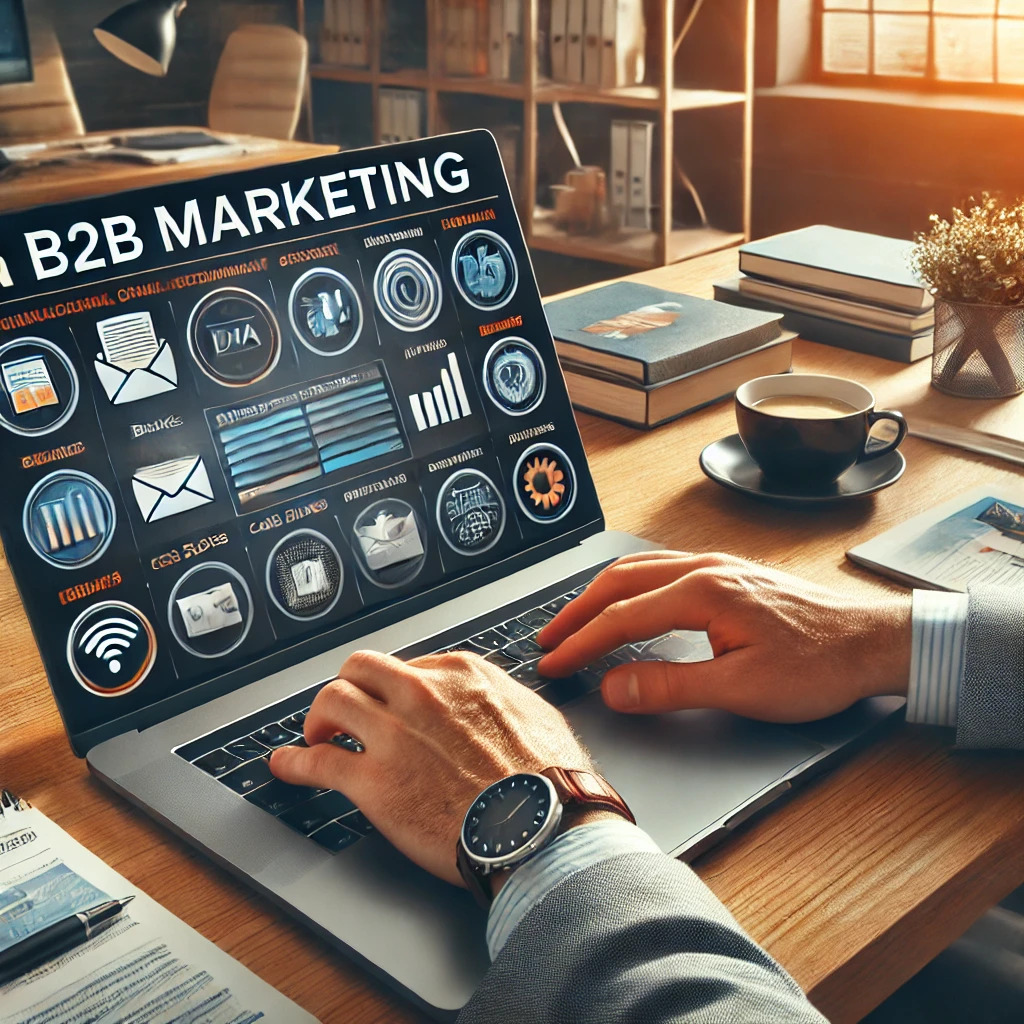In the world of B2B marketing, email campaigns remain one of the most effective tools for nurturing leads and building relationships with potential clients. However, with a crowded inbox and busy decision-makers, simply sending promotional emails won’t suffice. To truly connect with your audience and drive conversions, integrating educational content into your B2B email strategy is key. Educational content provides valuable insights, addresses pain points, and establishes your brand as an authoritative figure in your industry. This article explores the role of educational content in B2B email campaigns, from building trust and authority to engaging your audience and ultimately guiding them through the sales funnel.
Building Trust and Authority Through Educational Content

In the world of B2B marketing, trust and credibility are paramount to building long-lasting relationships with potential clients. Educational content plays a vital role in positioning your brand as an authoritative figure in your industry, helping you stand out from competitors and fostering trust with your audience. By providing valuable insights and useful knowledge, businesses can demonstrate their expertise, ultimately earning the trust of their B2B audience and driving stronger engagement.
How Providing Valuable Insights and Knowledge Positions Your Brand as a Trusted Industry Leader
One of the most effective ways to build trust with your audience is by offering valuable content that addresses their pain points, challenges, and needs. When businesses consistently provide helpful and insightful information, they position themselves as experts in their field. For example, an IT solutions company might share industry trends, best practices, or security tips, showing that they understand the complexities of their clients’ needs and are capable of providing solutions.
Valuable content not only educates your audience but also helps them make informed decisions. When your target audience feels empowered and well-informed, they’re more likely to trust your brand over others. Educational content nurtures a sense of transparency, and B2B buyers are more inclined to work with companies that demonstrate clear expertise and an understanding of their unique business needs.
The Role of Educational Content in Establishing Credibility with B2B Audiences
Credibility is essential in the B2B space, where decision-making often involves multiple stakeholders and significant investments. Educational content helps build credibility by providing prospects with reliable, well-researched information. The more your audience learns from you, the more they come to see your brand as a trusted advisor rather than just a vendor.
For instance, an accounting software company could publish detailed guides on tax regulations or financial reporting best practices. This not only helps the audience solve immediate problems but also reinforces the idea that the company understands the industry’s complexities and can be relied upon for expertise. Educational content can also help to position your business as a thought leader, which in turn enhances your credibility.
Examples of Educational Content Types (eBooks, Case Studies, Webinars) That Help Build Trust
There are several types of educational content that can effectively establish trust and authority in B2B email campaigns:
- eBooks: Offering in-depth guides or eBooks on industry-specific topics allows your audience to access valuable information in a comprehensive format. For example, a B2B software company might create an eBook on “The Future of Cloud Computing in Business,” showcasing their deep knowledge while providing actionable insights.
- Case Studies: Demonstrating how your products or services have successfully solved challenges for other businesses can significantly enhance your credibility. Case studies provide real-world examples of how your expertise has benefited others in similar situations, making your solutions more tangible and relatable.
- Webinars: Hosting live or recorded webinars offers an interactive way to engage with your audience while showcasing your expertise. These sessions allow your brand to directly address questions, share insights, and interact with participants, creating a strong sense of authority and trust.
By incorporating these types of educational content into your B2B email campaigns, you not only provide value but also position your brand as a trusted resource, encouraging deeper engagement and fostering long-term relationships with your audience.
In conclusion, educational content is a powerful tool in building trust and authority with B2B audiences. By offering valuable insights, demonstrating industry expertise, and using content formats such as eBooks, case studies, and webinars, your brand can establish credibility, enhance relationships, and ultimately drive business success.
Engaging Your Audience: How Educational Emails Drive Customer Interaction

When it comes to B2B email campaigns, engagement is the key to fostering strong relationships and driving conversions. Educational content plays a significant role in boosting engagement, as it offers real value to recipients. By providing relevant, informative, and insightful content, businesses can create emails that not only encourage opens and clicks but also spark meaningful interactions with their audience. Below are key ways educational emails can drive engagement and strengthen relationships with subscribers.
The Impact of Relevant and Informative Content on Driving Opens, Clicks, and Interactions
The foundation of successful B2B Email Campaigns lies in providing content that is both relevant and valuable to your audience. When emails offer information that solves a problem, educates, or answers common questions, subscribers are more likely to open, read, and engage with them. Relevant content also improves the chances of email recipients taking action, such as clicking on links, downloading resources, or exploring your website further.
For example, if your business provides marketing automation software, sending an email that educates subscribers on how to effectively use automation tools to increase efficiency will resonate more with them than a generic sales pitch. Tailoring this approach specifically to B2B Email Campaigns adds value to the subscriber’s business operations, making them more inclined to click through to learn more, download related content, or even consider your product or service.
By consistently delivering content that addresses your subscribers’ pain points or provides insights into industry trends, you increase the likelihood of future opens and clicks, turning casual readers into engaged prospects. This consistency is a hallmark of high-performing B2B Email Campaigns.
Using Educational Content to Spark Conversations and Encourage Replies from Subscribers
Educational emails do more than inform; they also serve as a platform for initiating conversations with your audience. B2B Email Campaigns can achieve this by offering content that invites discussion or asks questions, creating opportunities for subscribers to engage with your brand directly. When you ask for feedback, opinions, or personal experiences, you make it easy for recipients to reply.
For instance, you could send an email that includes a valuable industry report and encourage subscribers to share their thoughts on the findings. This strategy works particularly well in B2B Email Campaigns, as it prompts recipients to reply with questions or insights, leading to further discussions that deepen your relationship. Additionally, emails with personalized educational content can foster a sense of trust, as they reflect an understanding of the subscriber’s needs or challenges.
By encouraging replies and conversations, B2B Email Campaigns help to humanize your brand, establish authority, and show your audience that you care about their concerns and feedback.
How Interactive Elements Like Quizzes, Surveys, or Polls in Educational Emails Increase Engagement
Interactive content, such as quizzes, surveys, or polls, is a powerful tool for boosting engagement in educational emails. These interactive elements invite recipients to actively participate, making them more invested in the email content. For example, a poll asking for feedback on industry trends or a quiz to assess a subscriber’s knowledge about a specific topic can provide both value and entertainment.
Beyond increasing engagement, interactive elements also provide valuable data about your subscribers. Surveys and quizzes allow you to gather insights into your audience’s preferences, challenges, or knowledge gaps, which can be used to tailor future content or offers more effectively. This personalization deepens the connection between your brand and your audience, leading to higher engagement rates and stronger relationships.
In conclusion, educational content in B2B email campaigns is a powerful tool for engaging your audience. By delivering relevant and valuable content, sparking conversations through interactive elements, and encouraging replies, you not only increase open rates and clicks but also build lasting relationships with your subscribers. Incorporating interactive features further enhances engagement, creating an email experience that resonates with your audience and drives action.
Converting Leads: How Educational Content Nurtures the Sales Funnel

Educational content plays a critical role in guiding prospects through the B2B Email Campaigns, helping to nurture leads and ultimately drive conversions. B2B sales cycles tend to be longer, with multiple touchpoints and decision-makers involved, which makes it essential for businesses to provide valuable content that addresses the unique needs and challenges of their prospects at each stage. By using B2B Email Campaigns strategically, businesses can not only educate but also nurture leads, moving them closer to making a purchase decision.
The Role of Educational Content in Guiding Prospects Through the B2B Buyer’s Journey
The B2B Email Campaigns typically involve several stages: awareness, consideration, and decision. In each stage, educational content can help move prospects further down the funnel by addressing their specific needs and providing value.
- Awareness Stage: At this early stage, prospects may not even be aware of your product or service. Educational content here focuses on informing them about industry challenges or trends that they are experiencing. For example, a SaaS company could send an email educating potential clients about the latest trends in digital transformation in their industry, using B2B Email Campaigns to provide insights into how these changes affect their business.
- Consideration Stage: In this phase, prospects are actively researching solutions to their challenges. Educational B2B Email Campaigns during this stage should provide comparisons, case studies, and detailed content that explain how your product or service addresses these pain points. For instance, offering a white paper on how your software improves operational efficiency would resonate with a prospect comparing different solutions.
- Decision Stage: When prospects are ready to make a decision, B2B Email Campaigns should present clear, actionable steps to convert, such as offering product demonstrations, free trials, or a detailed ROI analysis. This content reinforces the value of your solution and helps ease the final decision-making process.
By tailoring educational content to these specific stages, businesses can guide prospects smoothly through the sales funnel, increasing the likelihood of conversion through B2B Email Campaigns.
How Educational Emails Address Pain Points and Provide Solutions That Lead to Conversions
Educational emails in B2B Email Campaigns serve as both informative and persuasive tools by addressing the pain points of your prospects and offering solutions. When you understand the challenges your audience faces, you can create emails that speak directly to their needs and provide valuable insights into how your product or service can help.
For example, a business that provides cybersecurity solutions can send an email detailing common security risks faced by small to medium-sized enterprises (SMEs) and how their solutions mitigate those risks. This not only educates the prospect but also subtly positions your product as the solution they need. By demonstrating how your offerings solve real problems through B2B Email Campaigns, educational content builds trust and helps convert leads into customers.
Examples of Successful B2B Campaigns That Have Converted Leads Through Educational Content
Several B2B companies have successfully used B2B Email Campaigns to convert leads through educational content. For instance, HubSpot, a leader in inbound marketing software, regularly sends emails offering valuable educational resources like blogs, eBooks, and webinars on topics such as marketing automation and lead generation. These resources educate prospects and help them understand how HubSpot’s tools can help them solve their challenges. Over time, this educational approach nurtures prospects and builds trust, leading to higher conversion rates.
Another example is Salesforce, which frequently uses B2B Email Campaigns to introduce prospects to its CRM software by offering useful guides, case studies, and industry-specific reports. These resources not only educate but also demonstrate the software’s value, providing potential customers with the information they need to make an informed purchase decision.
In conclusion, B2B Email Campaigns play a pivotal role in converting leads through the sales funnel. By providing relevant and valuable information at every stage of the buyer’s journey, businesses can address pain points, nurture relationships, and guide prospects toward making a purchase decision. Successful B2B Email Campaigns leverage educational content to build trust, offer solutions, and ultimately convert leads into loyal customers.
Conclusion
In conclusion, educational content is an invaluable asset in B2B email campaigns, helping brands foster trust, engage their audience, and drive conversions. By offering valuable insights and solutions to common industry challenges, businesses can position themselves as trusted experts, encourage meaningful interactions, and nurture leads through the buyer’s journey. Whether through eBooks, case studies, or interactive elements like quizzes and surveys, integrating educational content into your email campaigns can significantly enhance your ability to connect with prospects and convert them into loyal customers. As B2B marketers continue to focus on delivering value, educational content will remain a critical component of successful email strategies.

